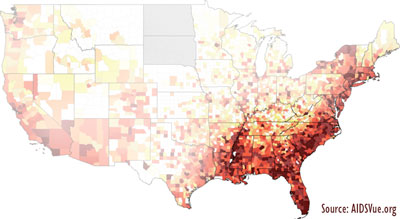The Southeast Aids Education and Training Center serves the HIV/AIDS Educational Needs of Health Care Providers in Alabama, Florida, Georgia, Kentucky, Mississippi, North Carolina, South Carolina, and Tennessee.
AIDS Education & Training Center
The AETC Program has been a cornerstone of HRSA's HIV/AIDS program for over two decades. The mission of the AIDS Education and Training Centers Program (AETC) is to increase the number of health care providers who are effectively educated and motivated to counsel, diagnose, treat, and medically manage people with HIV disease, and to help prevent high-risk behaviors that lead to HIV transmission.
This mission is obtained through implementation of multidisciplinary education and training programs for health care providers in the prevention and treatment of HIV/AIDS. Overall, the AETC Program is charged with increasing the knowledge, skills and behaviors of providers and organizations to be able to provide quality care and increase access to care.
The AETC Program aligns with the goals of the National HIV/AIDS Strategy (NHAS):
- Reduce new HIV infections;
- Increase access to care and improve health outcomes for people living with HIV; and
- Reduce HIV-related health disparities.
The Challenges
In 2010, the region had the highest rates of HIV and AIDS diagnoses in the country as well as the highest number of people living with HIV compared to all other regions. Individuals diagnosed with HIV in the South fare poorly compared to other areas of the country. Three-year HIV survival rates were the lowest in the country. In addition, the SE AETC region has higher rates of HIV and AIDS diagnoses in women, blacks, and Hispanics, as compared with the rest of the country.
The geographical area served by SE AETC comprises diverse populations of PLWHA and HIV care providers faced with unique challenges and barriers to care. As the national HIV/AIDS epidemic has evolved, clinical care has moved from crisis-based, specialty interventions to long-term chronic disease management. As virologic control became the expected goal, poverty, stigma and access to expert care became critical factors that determined successful outcomes for People Living with HIV/AIDS (PLWHA).
The PLWHA seeking care in a small clinic in the rural South may have to deal with geographic and social isolation, stigma, religious intolerance, limited healthcare resources and extreme poverty while the PLWHA seen in a large urban HIV treatment center may be faced with overburdened staff, homelessness, substance abuse, and mental health issues.
The clinician treating these complicated, underinsured patients often has to focus on metabolic disease as well as monitoring and managing the patients HIV infection. Problems with polypharmacy, adherence, medication access and tolerability of treatment regimens are all magnified in these patients who may be traveling long distances to see their providers.
We're here to help!
Health care providers, including HIV specialists and primary care providers, need access to the knowledge and skills necessary to ensure that HIV care is consistent with established guidelines and reflects current research. As the treatment of HIV disease is not restricted to any one medical specialty, various health care professionals serve as HIV experts. Ongoing continuing education is required for HIV expertise, regardless of specialty training.
The AETC Program and its multiple components work together and serve as a comprehensive training and educational resource for health care providers in the treatment and prevention of HIV/AIDS










